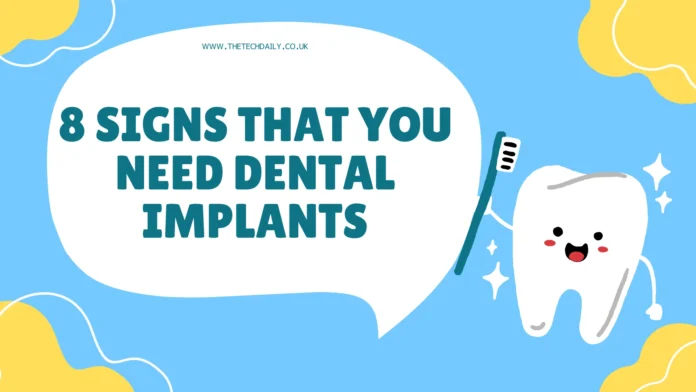Like many aspects of health, dental care is often overlooked until an issue arises. Concerns such as a gap, a missing tooth, difficulty chewing, or jaw pain can often dental problems. These issues can signal that you might need dental implants.
In this guide, I will talk about the 8 Signs That You Need Dental Implants and discuss the reasons you shouldn’t ignore these indicators. Early recognition of dental symptoms can help you take timely measures and safeguard your smile and health.
You Have One or More Missing Teeth
Of all the indicators, this is the most important. The gap left by missing teeth as a result of injury, decay, or gum diseases, is not only for aesthetics. Teeth that are lost may lead to nearby teeth shifting, bite issues, and jawbone degeneration.
Replacing missing teeth with dental implants provides a permanent, natural solution that also restores jawbone health, and preserve the facial structure.
You are Experiencing Problems with Loose or ill-Fitting Dentures
If your dentures are shifting, causing discomfort, or making it difficult to speak or eat, then it is generally best to try a more reliable alternative. One of the lesser-known but still significant indicators of the need for dental implants is the persistent frustration with dentures.
Implant-supported dentures snap into place for superior stability. You will no longer have irritations with slippage or messy adhesives, as these will no longer be required. Patients report a near full restoration of functionality and feel, as though their natural teeth have been restored.
You find Chewing or Biting Difficult
Do you find yourself staying away from certain foods because of their increased difficulty during chewing? Do you often experience pain when you attempt to bite down? These are often manifestations of missing teeth, weak roots, or worn down crowns and indicate that your teeth are no longer functioning properly.
To successfully bite down on food and eat a normal diet, dental implants offer to restore the necessary bite force. If chewing, generally a non-strenuous activity, is turning into a chore, then it’s a healthy sign to consult your dentist regarding implants.
Your Face Looks Older or More Sunken Than Your Actual Age
Missing teeth can often go unnoticed, but when gaps are left over time without dental implants, the jawbone begins to erode and such gaps can alter the makeup of your face. This is often the case in those who have a complete absence of teeth, and the face begins to sag or show signs of premature aging.
Dental implants can reverse the signs of aging, and with a more youthful and vital facial structure. They do so by mimicking the roots of natural teeth, which helps to preserve the jawbone and in turn, promotes growth of the bone. This is especially true for the cheeks, jaw, and overall facial bone structure.
You Are Notified About Losing Bone in Your Jaw
A dental or oral surgeon is often the first line of defense when it comes to fighting bone loss in the jaw. Gap teeth, dentures, and other modern dental functions are often accompanied by bone loss which is common but overlooked. Such adjuncts can negatively impact the oral fitness of a person.
An implant is the best long-term solution and helps avert the onset of bone loss. This process, although some patients might require a bone graft initially, but in the long run is extremely beneficial and helps boost implant retention.
You Have Severely Cracked or Broken Teeth
Not every cracked or broken tooth needs to be pulled out, but when repair is impossible, replacing it with a dental implant is likely the most suitable option. Restoration with a crown, filling, or bonding would be futile.
Implants have a long life span and do not affect the health of adjacent teeth. Moreover, if you find yourself paying multiple visits to the dentist due to repairs on the same tooth, then perhaps it is best to consider an alternative.
You Have an Infected Tooth That Can’t Be Saved
Root canal treatment is the most common option for an infected tooth, but in some cases where there is extensive spread or repeated infections, extraction becomes necessary.
This is one of the critical 8 signs that you need dental implants. For those who do not wish to have long-term gaps or shifting teeth, gaps created due to extraction can be filled with implants to keep the remaining teeth healthy and aligned.
You’re Done with Stopgap Measures
Having used removable bridges or dentures, and having gone through dental work multiple times, it is clear these are not sustainable. You may want to consider dental implants instead. They can last for decades and with proper care, dental implants can offer unparalleled durability and functionality.
Improved confidence, oral health, and a return to enjoyment of various activities such as eating and speaking are common among patients. For those seeking a permanent solution, dental implants certainly warrant consideration.
What Makes Dental Implants A Significant Medical Advancement
Made from titanium, dental implants serve as artificial roots of the teeth. They undergo a fusing process, called osseointegration, with your jawbone. After a natural-looking crown is placed atop post-healing, the result is a tooth that both looks and feels like the original.
Some benefits of dental implants are:
- Boost in appearance and self-esteem
- Enhanced capability of speech and chewing
- Longevity and durability
- Protection against bone loss
- Preservation of adjacent teeth
Who Is An Ideal Candidate for Dental Implants?
If you identify with eight distinct signs that indicate the need for dental implants, it’s best to consult a dentist or oral surgeon. Good candidates are often characterized by:
- Good periodontal health
- Adequate jawbone volume (or willingness to undergo bone grafting)
- Maintenance of oral hygiene
- Absence of uncontrolled chronic illnesses such as diabetes or heart disease
Even with uncertainty, a self-assessment can provide clarity and a personalized pathway.
Conclusion
Identifying the eight signs of requiring dental implants is the vital step towards regaining oral health and self-esteem. The absence of a tooth, problems with chewing, or a smile that doesn’t reflect the vivacity within, dental implants deliver a reliable and enduring solution.
Acting sooner rather than later can help avert a more complex situation. Consult a dental professional and understand the ways implants can aid in restoring optimal functionality and the smile you are entitled to.
Q: What are the 8 Signs That You Need Dental Implants?
The 8 signs that indicate the necessity for dental implants are: missing teeth, difficulty chewing, loose or shifting dentures, facial sagging, jawbone loss, cracked or broken teeth, teeth that are infected and non-restorable, and anger and dissatisfaction towards temporary dental treatments.
Q: How do I know if I qualify based on the 8 Signs That You Need Dental Implants?
If you have any of the signs and symptoms listed, like if you have missing teeth or difficulty chewing, chances are that you do qualify. A dental checkup and X Rays will determine if you qualify or not.
Q: Can I get implants if I already show multiple signs from the 8 signs that you need dental implants list?
Of course, it is possible to get implants even with multiple signs from the 8 signs that you need dental implants. With the advancements in dental practice, most of your dental issues can be treated with implants and in some cases, with bone grafting and various other procedures.
Q: Are the 8 signs that indicate you need dental implants applicable to patients with only one missing tooth?
Of course. Even a single missing tooth qualifies as one of the 8 signs that you need dental implants. If you neglect dental implants, bone loss or shifting of adjacent teeth is likely to occur.
Q: How soon should you act if one or more of the 8 signs that indicate you need dental implants becomes apparent?
As soon as possible. Postponing dental treatment after recognizing the 8 signs that you need implants can result in more advanced complications, such as bone loss or additional tooth loss.



